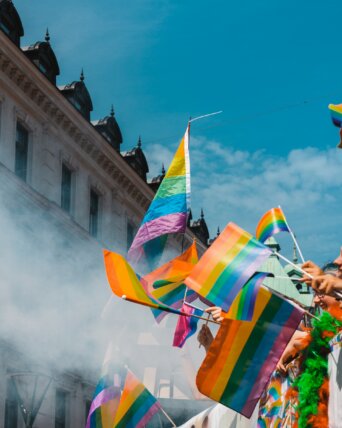- About
- Topics
- Picks
- Audio
- Story
- In-Depth
- Opinion
- News
- Donate
- Signup for our newsletterOur Editors' Best Picks.Send
Read, Debate: Engage.
| topic: | LGBT Rights |
|---|---|
| located: | Chile |
| editor: | Ellen Nemitz |
Chile celebrated a human rights victory last week as a law permitting same-sex marriage was passed in the Legislative Houses on 7 December. The advancement is supported by the current right-wing president, Sebastián Piñera - who is likely to sign the law after having changed his mind about the topic - but is criticised by other conservative politicians.
Moreover, it has been read as a provocation against José Antonio Kast, the far-right candidate running in the presidential elections, the second round of which will be held on 19 December. This is because Kast - whose father was part of the Nazi party, as investigations have shown - is a strong advocate of heteronormacy and other conservative policies, and has reaffirmed this belief regarding the new law.
Homosexual couples had previouly gained some rights through civil unions in 2015, but the bill demanding legal marriage had been pending for four years, since the former-president Michelle Bachelet (now the UN High Commissioner for Human Rights) presented the bill. The passing of this legislation is a further progressive step that grants homosexual couples the rights to adoption and assisted reproduction, and exempts trans people from needing to divorce in order to have their gender recognised. According to the Human Rights Watch, the role of Chilean activists on the recognition of LGBTQ+ rights is remarkable.
Earlier this year, for the occasion of the International Day Against Homophobia, Biphobia and Transphobia, observed on 17 May, the University of Chile published an opinion piece by Margarita Bustos, the coordinator of Sexual Diversity and Gender area at the University's Office of Equity and Inclusion, in which she highlights the "increase in violence, attacks resulting in death, political social groups organised with hate speech through social networks and the press."
Likewise, the Annual Report on Human Rights in Chile 2021 also points out that LGBTQ+ people, along with women, are among the most affected by structural gender inequality and discrimination, added to a historic concealement of such violences. While the new legislation comes with hope, as people from marginalised communities are being represented in the group at the convention writing Chile's future new Constitution, the document highlights that "the negligible percentage that they represented - about 1.5 percent of the candidates to the Convention - in particular trans people, shows that more measures are necessary to achieve" the adequate policies to ensure the same civil and human rights to this population.
The advance of LGBTQ+ rights in Chile is worth celebrating, indeed. However, it is also remarkable that it took until now to recognise a basic right, which faced major resistance. Furthermore, we need to take into account that allowing same-sex marriage is just one step. Argentina, Brazil, Colombia, Costa Rica, Ecuador, Uruguay and several Mexican states have already legalised this right, but have still not been able to implement public policies capable of stopping gender-based violence or boosting LGBTQ+ inclusion in education and work forces, - especially for trans and queer people, who suffer the most with prejudice. Brazil is probably the best example: same-sex marriage has been allowed since 2013, homophobia is considered a crime, but it is still the country with one of the highest rates of crimes against this community.
May the victory in Chile be followed by the actual acceptance LGBTQ+ people.
Photo by Teddy Österblom

